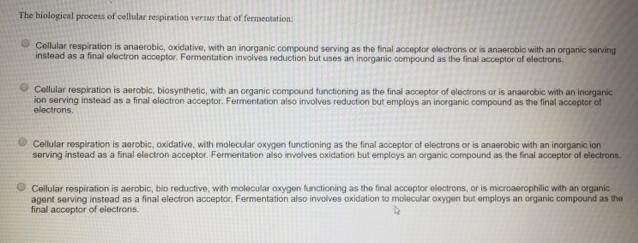Answered step by step
Verified Expert Solution
Question
1 Approved Answer
The biological process of cellular respiration versus that of fermentation: Cellular respiration is anaerobic, oxidative, with an inorganic compound serving as the final acceptor

The biological process of cellular respiration versus that of fermentation: Cellular respiration is anaerobic, oxidative, with an inorganic compound serving as the final acceptor electrons or is anaerobic with an organic serving instead as a final electron acceptor. Fermentation involves reduction but uses an inorganic compound as the final acceptor of electrons. Cellular respiration is aerobic, biosynthetic, with an organic compound functioning as the final acceptor of electrons or is anaerobic with an inorganic ion serving instead as a final election acceptor. Fermentation also involves reduction but employs an inorganic compound as the final acceptor of electrons. Cellular respiration is aerobic, oxidative, with molecular oxygen functioning as the final acceptor of electrons or is anaerobic with an inorganic ion serving instead as a final electron acceptor. Fermentation also involves oxidation but employs an organic compound as the final acceptor of electrons Cellular respiration is aerobic, bio reductive, with molecular oxygen functioning as the final acceptor electrons, or is microaerophilic with an organic agent serving instead as a final electron acceptor. Fermentation also involves oxidation to molecular oxygen but employs an organic compound as the final acceptor of electrons.
Step by Step Solution
★★★★★
3.48 Rating (148 Votes )
There are 3 Steps involved in it
Step: 1
The detailed answer for the above question is provided below 3rd option is correct In cellular respi...
Get Instant Access to Expert-Tailored Solutions
See step-by-step solutions with expert insights and AI powered tools for academic success
Step: 2

Step: 3

Ace Your Homework with AI
Get the answers you need in no time with our AI-driven, step-by-step assistance
Get Started


